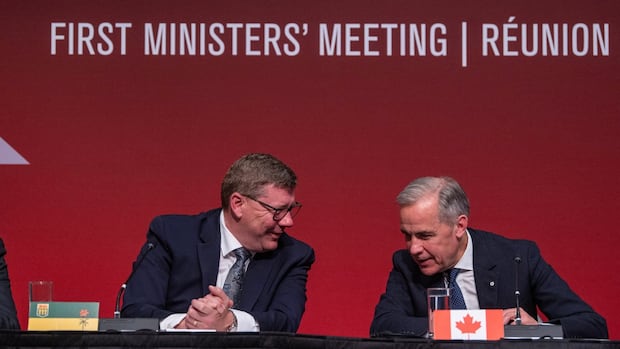Alberta Premier Danielle Smith says she likes the federal government’s plan to reduce the approval times of major infrastructure projects down to two years, and she hopes Canada can revise other legislation to “improve investor confidence.”
“I think part of [Prime Minister Mark Carney’s] job is to create an investment climate that tells the investor community ‘welcome back to Canada’ because it hasn’t done that for the last 10 years,” Smith said during an interview on Rosemary Barton Live that aired Sunday.
Carney and his Liberal government have been charging ahead with plans to speed up nation-building infrastructure projects — a central plank of the party’s election platform.
Earlier in June, the Liberals tabled the One Canadian Economy Act, which Carney said at the time is a bill designed to create one Canadian economy out of 13 and build “a stronger, more resilient Canadian economy” that works for everyone.
The prime minister said the bill will speed up the approval process of major infrastructure projects — reducing approval times from five years to two by introducing a “one-project, one-review” approach instead of having federal and provincial approval processes happen sequentially.
Smith told host Rosemary Barton that the fact Carney wants a two-year time frame to approve national projects “is a demonstration he knows the federal process is broken,” and Alberta is eager to hit the ground running on resource projects.
The Alberta premier is also calling on Ottawa to “substantially” revise Bill C-69, also known as the Impact Assessment Act. The bill, which came into force in 2019, allowed federal regulators to consider potential environmental and social impacts of resource and infrastructure projects.
Some sections of the law were amended after the Supreme Court of Canada ruled in 2023 that portions of the Impact Assessment Act (IAA) were unconstitutional. The Alberta government said the changes were insufficient and called the revised bill “unconstitutional.”
Smith said Ottawa has jurisdiction over projects that cross borders, but there are requirements in the IAA that are ideological and difficult to measure. The act needs revisions, she said, because “we’ve got to keep up with the Americans and they’re changing their regulatory processes to be that fast as well. If we don’t keep up, we’re going to lose this window of investment.”
Is Canada moving too fast?
Critics of the One Canadian Economy Act say the legislation interferes with Indigenous rights and environmental protections. They also argue that the bill confers king-like powers to rush to completion projects deemed in Canada’s national interest.
Proposed legislation grants the federal government the authority to exempt pipelines, mines or other listed projects from any law or government regulation.
Near the very end of the 18-page bill, it states that cabinet can exempt national-interest projects from not only environmental laws but also acts of Parliament.
Intergovernmental Affairs Minister Dominic LeBlanc, who’s also responsible for One Canadian Economy and Canada-U.S. trade, defended the bill on Rosemary Barton Live and said Canadians shouldn’t be surprised the Liberals put forward legislation to expedite projects deemed in the national interest.
“We got a mandate from Canadians. It’s on page 1 of the Liberal platform to talk about one Canadian economy — not 13 — and to build big national projects again,” LeBlanc told Barton.
Canada is trying to work with U.S. President Donald Trump’s team to end the Canada-U.S. trade war, but things are not moving fast enough, he said. Because of that, the country needs to do things “that perhaps previously were taking too long or the process was incoherent.”
Carney is to meet with Trump on Monday morning in Alberta, before main talks at the G7 leaders’ summit get underway, according to an official in his office.
Smith said that since her province is hosting the G7 summit in Kananaskis, Alta., she can ask for a bilateral meeting with one of the world leaders and has requested Trump, Australian Prime Minister Anthony Albanese and Japanese Prime Minister Shigeru Ishiba.
